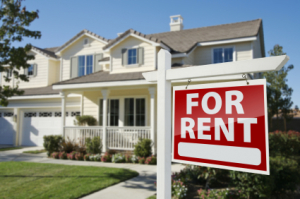This is a guest post from Emily Guy Birken who writes at One Money Design.

However, owning an investment rental property is not all about pushing wheelbarrows of passive income to the bank. Being a landlord comes with many risks-and just like any investment, you may not see a payoff. To know if you’re ready to handle these risks, ask yourself the following questions:
1. Do I have the necessary cash? Before you can even get to the point where you are complaining about unreliable tenants, you’ll need to get financing from your bank. But just as many American homebuyers are gun shy about the housing market, banks are also much stingier about handing out loans. Gone are the days when you could take out a second mortgage to function as your down payment. In order to be approved for your mortgage, you will have to have at least a 20% down payment-and putting down more money will likely qualify you for a better mortgage rate.
But that’s not the end of your cash needs. Lenders will also be looking to see that you have enough in savings to cover at least six months worth of expenses-both your personal expenses and rental expenses. Should you have trouble finding a tenant right away, the bank needs to know that you won’t immediately lose your shirt.
2. Will I be able to make a profit? The rule of thumb for rental properties that produce a positive cash flow is that you should be able to charge 1% of the mortgage price for each month’s rent. So a $100,000 mortgage should be bringing in $1000 in rent per month.
This is a fairly easy calculation to do as you are looking for rental properties since you should be able to determine rental rates for comparable houses in your area.
However, you also need to take into account your vacancy rate. Most real estate professionals advise landlords to assume 10% vacancy per year. In other words, you should only plan on having rental income 10.5 months per year.
Between the 1% rule and the possibility of vacancy, you will need to determine if you have the necessary funds to handle down times, or if your monthly rental income will generate enough extra that you will be able to ride out vacancies.
3. Do I have a good team of professionals in place? You don’t want to start looking for a contractor, an electrician, or a plumber after a problem arises in your rental property. So start building a relationship ahead of time with maintenance personnel so that you can simply call them when you need them and you can trust that they will be reliable and timely. You do not want the stress of dealing with an undependable contractor on top of soothing unhappy tenants.
In addition to maintenance, you will also want to build a relationship with an attorney who can help to advise you on issues with your tenants. Again, the time to go looking for a lawyer is not after your tenants have stiffed you on three months worth of rent.
4. Do I have the stomach for this? There is any number of horror stories about deadbeat tenants or unexpected damage to rental properties that could scare away potential landlords. It pays to understand that screening your tenants do not always weed out the unsavory individuals, and to recognize that not even a thorough inspection of a new rental property can stop damage from occurring.
If you can’t abide the thought of dealing with middle-of-the-night phone calls to come fix leaking pipes or having to evict a tenant who is behind on the rent, becoming a landlord might not be the investment for you.
If you’re not certain whether you could handle the necessary work, consider using a property management service. These managers handle much of the landlord work that you would otherwise have to do, like screening tenants, performing maintenance, and collecting rent. Generally, they charge 8% to 10% of the yearly rent for this service, whether or not your have a tenant. However, if you can afford this service and worry about the potentially unpleasant aspects of owning a rental, this can provide you a good compromise.
The Bottom Line
While owning a rental property can be an excellent investment, you need to make sure that you enter into it with both eyes open and a clear idea of what could go wrong.

What kind of advice would you give to those of us with home-buying phobia? Economically, I think a rental property is a good idea. Emotionally, I don’t want to have anything to do with buying and managing a rental house!
I am still trying to handle my first situation with my home. So far I am doing well but rental property isn’t in the cards just yet.
First of all, allow my family recognize a persons command during this matter. Even though this is certainly brand new , nevertheless soon after registering your site, this intellect has exploded extensively. Allow all of us to take hold of ones rss to help keep in touch with at all probable messages Sincere understand but will pass it on to help admirers and my individual are living members
I’ve owned a rental property for 10 years and have enjoyed it so far. I think your points are spot on. One big mistake I’ve seen is people who don’t have enough money to cover big problems/repairs. You really should have a separate emergency fund for your rentals.
There are some interesting points in this clause but I dont know if I see all of them eye to heart. There is some validity but I will take hold legal opinion until I look into it further. Good clause, thanks and we want more! Added to FeedBurner as well.